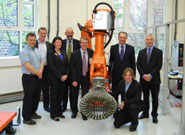A relative motion robotics centre of excellence will open at the University of Bristol to research and develop an autonomous engagement solution for in-flight refuelling.
A relative motion robotics centre of excellence will open at the University of Bristol to research and develop an autonomous engagement solution for in-flight refuelling. Cobham Mission Equipment has commissioned the centre, as part of the ASTRAEA Autonomy and Decision Making project. The South West RDA is providing significant support to this aspect of the programme.
A team of engineers from the University's Department of Aerospace Engineering and Cobham are working together to investigate and solve the challenges surrounding the "hook-up problem space", where technology will have to replicate the skills of a pilot in this challenging evolution.
This will involve the installation of two industrial robots, one track mounted, linked to a synthetic environment, to imitate the positional relationship between a tanker and receiver utilising the hose, drogue and probe refuelling system.
Dr Tom Richardson, Lecturer in Flight Mechanics in the Department of Aerospace Engineering at Bristol University, said: "Autonomous refuelling is a key component of future UAV operations, where flights for coastal and border surveillance might be required to last days or even weeks."
Alongside this research, an advanced composite manufacturing capability using the same robotic facility will be established. The provision of such a robotics facility has been identified as a key factor for the University to advance its research on automating composites processing.
It is envisaged that this research will be performed in collaboration with its industrial partners and the wider industrial community in the South West in addition to the newly established National Composites Centre.
The Relative Motion Robotics will be situated within the new Advanced Composites Centre for Innovation and Science (ACCIS), part of the University's Faculty of Engineering. The centre will be fully operational by this Autumn and in due course, will be available to the wider academic and industrial community for research within sectors such as maritime or manufacturing.
The ASTRAEA programme is jointly funded by UK industry and the public sector. Its objective is to enable the routine use of Unmanned Aircraft System (UAS) in all classes of airspace without the need for restrictive or specialised conditions of operation. The aim is the development and demonstration of key technologies and operating procedures required to open up the airspace.
Mr Richard Bourne, Programme Manager Research and Technology at Cobham Mission Equipment, said: "The development of this capability at Bristol University is crucial for addressing a significant issue within the evolving UAV market. It has already established stronger ties between the Company and the University which we hope to develop further and it will also deliver a flexible capability for further broad utilisation by industry and academia."
Further information
About Cobham
Cobham’s products and services have been at the heart of sophisticated military and civil systems for more than 75 years, keeping people safe, improving communications, and enhancing the capability of land, sea, air and space platforms. The Company has three divisions employing more than 11,000 people on five continents, with customers and partners in over 100 countries and annual revenue of some £1.9bn / $3 billion.
About Cobham Mission Equipment
Cobham Mission Equipment is a systems integration business that has been providing innovative solutions to its customers for over 75 years. The business is the market leader for air-to-air refuelling (AAR), providing fifth generation ‘nose to tail’ solutions from the cockpit of the tanker aircraft, to the tail of the receiver platform. More than 1,000 systems have been delivered for buddy-buddy refuelling, tactical and strategic tanking for fixed wing aircraft and helicopters, with unmanned air vehicle refuelling development well advanced.
The ‘nose to tail’ AAR capability is complemented by a comprehensive ‘wingtip to wingtip’ offering covering a range of weapons carriage and release equipment, including missile launchers, cryogenic cooling for missile seekers, pneumatic missile fin actuation and wing store carriers, bomb ejection, defensive aids, chaff and flare systems.
Mission Equipment is also a systems solution provider in the field of Explosive Ordnance Disposal (EOD) robot technology, providing a range of unmanned ground systems and robots serving international homeland security and military markets, with more than 700 systems delivered to 55 countries.
The ASTRAEA programme is co-funded by AOS, BAE Systems, Cobham, EADS Cassidian, QinetiQ, Rolls-Royce, Thales, the Technology Strategy Board, three Regional Government Agencies (NWDA, SEEDA and SWRDA), the Welsh Assembly Government and Scottish Enterprise.
TSB, Technology Strategy Board, is a business-led executive non-departmental public body, sponsored by the Department for Business, Innovation and Skills (BIS), responsible for promoting and supporting research into, and development and exploitation of, technology and innovation for the benefit of UK business, in order to increase economic growth and improve the quality of life.
North West Development Agency (NWDA), South East England Development Agency (SEEDA) and South West Region Development Agency (SWRDA): The mission of RDAs is to spread economic prosperity and opportunity to everyone in the nine regions of England. The RDAs take a business-led approach and bring vitality and expertise to the task of economic development and regeneration in the regions.
The Welsh Assembly Government is the devolved Government for Wales. Wales is committed to creating the best conditions and framework to enable innovative businesses to grow, building upon the strengths and skills of its people and natural environment.
Scottish Enterprise is the main economic, enterprise, innovation agency responsible for economic growth of Scottish companies by helping to build globally competitive sectors, attracting new investment and creating a world-class business environment.
